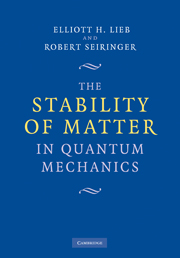Book contents
- Frontmatter
- Contents
- Preface
- 1 Prologue
- 2 Introduction to Elementary Quantum Mechanics and Stability of the First Kind
- 3 Many-Particle Systems and Stability of the Second Kind
- 4 Lieb–Thirring and Related Inequalities
- 5 Electrostatic Inequalities
- 6 An Estimation of the Indirect Part of the Coulomb Energy
- 7 Stability of Non-Relativistic Matter
- 8 Stability of Relativistic Matter
- 9 Magnetic Fields and the Pauli Operator
- 10 The Dirac Operator and the Brown–Ravenhall Model
- 11 Quantized Electromagnetic Fields and Stability of Matter
- 12 The Ionization Problem, and the Dependence of the Energy on N and M Separately
- 13 Gravitational Stability of White Dwarfs and Neutron Stars
- 14 The Thermodynamic Limit for Coulomb Systems
- List of Symbols
- Bibliography
- Index
6 - An Estimation of the Indirect Part of the Coulomb Energy
Published online by Cambridge University Press: 20 December 2010
- Frontmatter
- Contents
- Preface
- 1 Prologue
- 2 Introduction to Elementary Quantum Mechanics and Stability of the First Kind
- 3 Many-Particle Systems and Stability of the Second Kind
- 4 Lieb–Thirring and Related Inequalities
- 5 Electrostatic Inequalities
- 6 An Estimation of the Indirect Part of the Coulomb Energy
- 7 Stability of Non-Relativistic Matter
- 8 Stability of Relativistic Matter
- 9 Magnetic Fields and the Pauli Operator
- 10 The Dirac Operator and the Brown–Ravenhall Model
- 11 Quantized Electromagnetic Fields and Stability of Matter
- 12 The Ionization Problem, and the Dependence of the Energy on N and M Separately
- 13 Gravitational Stability of White Dwarfs and Neutron Stars
- 14 The Thermodynamic Limit for Coulomb Systems
- List of Symbols
- Bibliography
- Index
Summary
Introduction
In this chapter we shall bound the difference between the Coulomb energy of a system of many electrons in a state ψ and the electrostatic energy of the corresponding charge distribution ψ. This difference is also known as the indirect part of the Coulomb energy. Such a bound is not only relevant for the discussion of stability of matter, but is of importance in other areas such as density functional theory in quantum chemistry. While the results on this chapter will be used in one of our proofs of stability of non-relativistic matter in the next chapter, they are not strictly needed for the proof, and we shall give a different proof avoiding their use. A reader who is only interested in the quickest proof of stability can skip this chapter. The results will be of importance in the discussion of relativistic matter in Chapter 8, however.
As explained in Chapter 3, a quantum mechanical system of N particles has a state which, generally, is described by a density matrix. For our purposes here, only the (spin summed) diagonal part of this density matrix is relevant. Also, statistics does not play any role in this chapter; for our purposes here it does not matter whether we are dealing with Bose, Fermi or mixed statistics. In fact, the exchange energy defined below depends only on the N particle density (spin summed, in case of spin).
Information
- Type
- Chapter
- Information
- The Stability of Matter in Quantum Mechanics , pp. 105 - 120Publisher: Cambridge University PressPrint publication year: 2009
